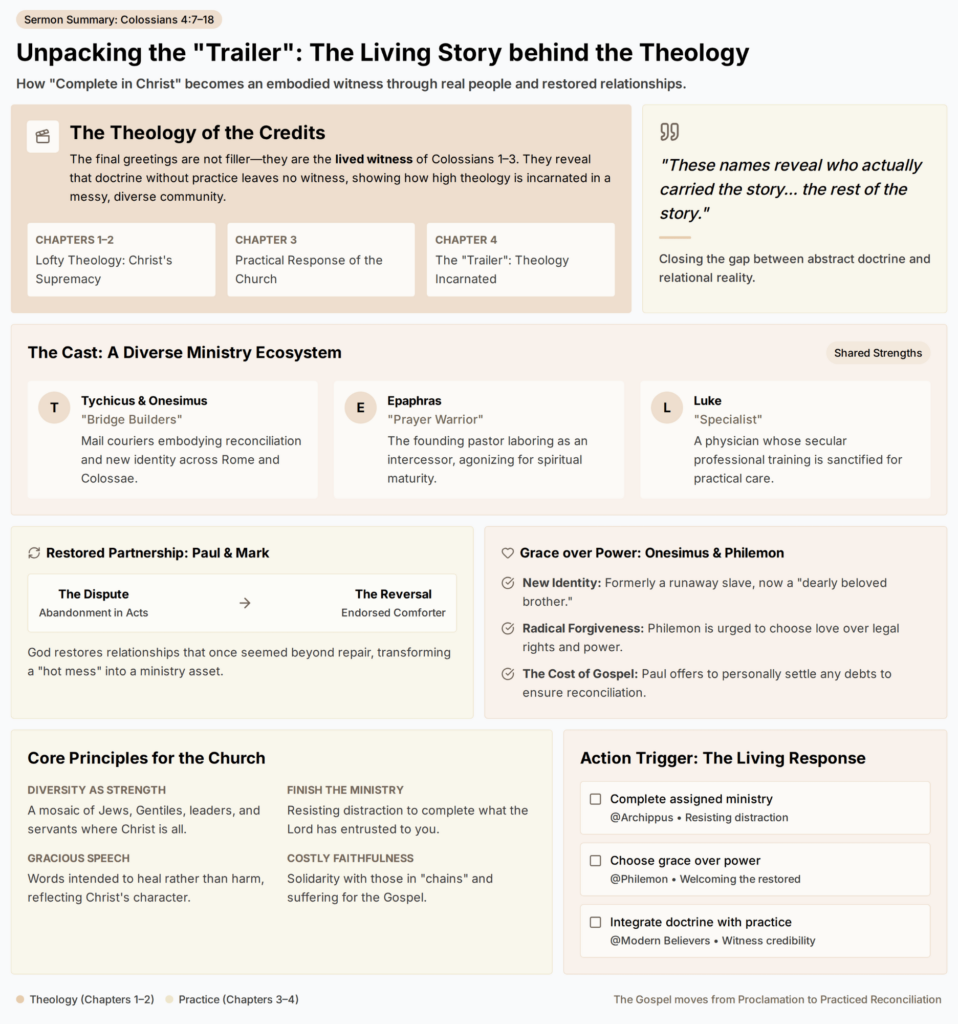Summary
This message examines the biblical concept of waiting, centered on Proverbs 13:12: “Hope deferred makes the heart sick, but a longing fulfilled is a tree of life.”
The pastor clarifies that waiting is not wasted time but a vital season for spiritual renewal and character formation, illustrated through biblical figures such as Abraham, David, and Joseph. These individuals received divine promises yet endured long stretches of hardship and uncertainty before fulfillment. The message highlights God’s presence in these waiting periods, shaping believers for their purpose, and cautions against forcing outcomes prematurely.
Ultimately, waiting is set within God’s broader redemptive story—from Eden to Christ’s return—assuring believers that their “Saturday” seasons of waiting will lead to a “Sunday” of fulfillment.
Knowledge Points
1. Understanding and Enduring Waiting
- The Meaning of “Hope Deferred”
- The proverb “Hope deferred makes the heart sick” refers to waiting for the fulfillment of a hope you already hold, not losing hope itself.
- Waiting is a challenging human experience, evident in daily life (e.g., traffic, lines) and spiritually (e.g., unanswered prayers).
- Feeling weary or questioning the length of a wait is a normal human response and does not indicate a lack of faith.
- The Purpose of Waiting
- Scripture teaches that waiting is not inactivity or wasted time.
- From Isaiah: “Those who wait upon the Lord shall renew their strength,” signaling waiting as a season for renewal.
- God is present in the waiting (“God is in your waiting”). The emphasis should be on seeking God during the wait, not fixating on its duration.
- The Hospital Analogy for Waiting
- Life’s crises resemble a hospital with an emergency room, an operating room, and a waiting room.
- The waiting room is especially difficult—time feels prolonged and uncertain.
- Biblically, every level of crisis includes a “waiting room” dimension.
- The “Saturday” Season
- The time between Jesus’s crucifixion on Good Friday and resurrection on Sunday is a “Saturday” season.
- For the disciples, Saturday—being a Sabbath—meant enforced stillness, deepening grief and uncertainty.
- This represents times when we are not only waiting for answers but also constrained, unable to move forward.
- In this period, disciples like Peter felt the promise had ended and were tempted to return to former ways (“Let’s go fishing”).
- This shows how waiting can breed despair, yet Jesus remains present (“on the shore”), ready to provide what is needed.
2. Biblical Examples of Waiting and Faithfulness
- Abraham: Certainty of God’s Promise
- God promised Abraham in Genesis 15 countless offspring, yet he and Sarah remained childless for decades.
- Abraham held to the promise, looking “forward to a city with foundations, whose architect and builder is God” (Hebrews 11:8–10).
- The certainty of God’s promise is not measured by speed of fulfillment. Believers often wait for God’s promises to unfold.
- David: Anointed but Hunted
- Anointed by Samuel to be king, David spent years as a fugitive, hiding from Saul.
- This contrasts divine promise with the rugged reality of the journey.
- When Saul entered the cave, David’s men urged him to kill Saul as a seemingly providential opportunity.
- David refused, recalling Proverbs 14:12 (“There is a way that appears right, but in the end it leads to death”) and honoring Saul as “the Lord’s anointed.”
- David’s refusal to rush ahead of God averted civil war and disaster. His wilderness years forged a selfless, steady leader, calm amid chaos.
- Joseph: From Betrayal to Forgiveness
- Joseph was betrayed, sold into slavery, falsely accused, and forgotten in prison.
- After a long time, he rose to second-in-command in Egypt, saving many lives—including his brothers’—during famine.
- Confronting his brothers, he acknowledged their intent yet focused on God’s purpose: “You intended to harm me, but God intended it for good… the saving of many lives.”
- The Israelites and Paul
- Israel was delivered from Egypt with the promise of a new land, yet first endured a wilderness journey—living between liberation and inheritance.
- Paul, once a persecutor, was transformed on the road to Damascus and became a leading apostle, showing God can rewrite any story.
- Martin Luther King Jr.
- As a contemporary example, Martin Luther King Jr. articulated a future vision (“I have a dream”) far from realized at the time.
- He envisioned a nation judging character over color, drawing on Amos’s justice.
- Though he did not see full fulfillment, his journey continues to inspire progress.
3. Implications of Understanding the Waiting Process
- Avoiding Disillusionment
- Recognizing waiting as part of God’s plan helps prevent disillusionment when suffering persists.
- It corrects the unbiblical idea that faith erases tension or that “more faith” prevents trials. Jesus promised trouble in this world and declared He has overcome it.
- Do not equate God’s delay with His absence. It is appropriate to ask “how long?” while seeking His presence in the present season.
- The Ultimate Fulfillment: The Tree of Life
- “A longing fulfilled is a tree of life” points to ultimate restoration.
- This tree connects back to Eden and forward to the new heaven and earth in Revelation.
- God’s redemptive arc moves from “garden to glory”: the fall, promise of redemption, the cross, and the ultimate restoration with no more death or pain.
- Our earthly “Saturday” seasons fit within this grand narrative—assured by the cross, awaiting the crown.
Assignments
- Reflect on personal “waiting seasons” and identify how to seek God’s presence and purpose within them rather than focusing only on duration.
- When tempted to “get ahead of God” or take control, practice pausing to discern whether the path that “appears right” aligns with God’s timing and character, as David did.
- In weakness or weariness from waiting, choose to trust God’s strength, remembering Paul’s teaching that “when we’re weak, that’s when we’re strong.”



